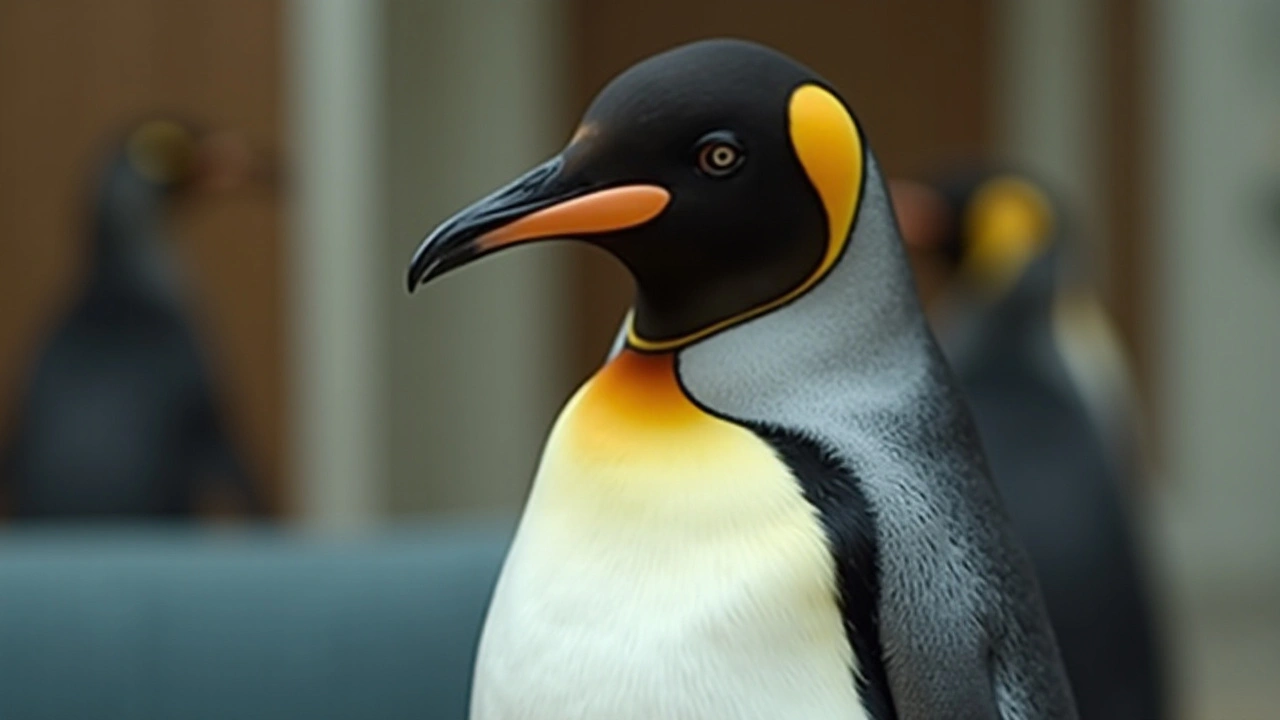A Rare Visitor: Emperor Penguin Lands on Australian Shores
The recent discovery of an adult male emperor penguin on an Australian beach has left wildlife experts puzzled and concerned. This extraordinary occurrence marks the first known instance of this species, native to the icy habitats of Antarctica, making an unexpected appearance in a temperate region like southwest Australia. Found on November 12, 2024, on a popular tourist beach, the penguin was stumbled upon by a group of shocked beachgoers. The sighting, some 3,500 kilometers north of its natural home, soon became a symbolic representation of the unpredictable effects of climate change on wildlife globally.
The Enigma of the Wandering Penguin
The emperor penguin's journey from its Antarctic ecosystem to the Australian coastline is nothing short of remarkable and concerning. These flightless birds are exceptional divers and swimmers, adapted to live in the coldest conditions on Earth. Their natural habitat in the pack ice offers them an environment above freezing with plenty of food resources like krill, fish, and squid. However, the discovery of this penguin straying so far from home indicates a disruption in their usual migratory and feeding patterns.

The Influence of Climate Change on Wildlife
Experts speculate that global warming-related changes in ocean currents and ice cover could be driving such anomalies. As ice melts at alarming rates due to rising global temperatures, the stable home environment and food supply for emperor penguins become threatened. Consequently, these changes may be forcing penguins to venture farther than usual in search of sustenance and suitable living conditions. Moreover, warmer ocean temperatures can disrupt marine life food chains, further impacting penguin populations.
Scientists have long warned that climate change poses a severe threat to biodiversity, with penguin species among the stark indicators of such risks. Their plight emphasizes a larger narrative on how melting ice affects marine ecosystems and the survival behaviors of species dependent on them. As our planet warms, these occurrences will likely become more frequent unless significant strides are made in conserving our environment.
A Call to Action for Conservation
The emperor penguin's unscheduled stop in Australia coincides with the ongoing discussions at the COP29 climate talks, adding urgency to debates over environmental preservation. The gathering of global leaders emphasizes the need for proactive measures to mitigate climate change impacts and safeguard vulnerable species like the emperor penguin. This incident is a glaring call for greater protection of these creatures and points to the interconnectedness of global ecosystems.
Conservationists argue that better understanding of such unexpected wildlife distributions can help tailor conservation plans more effectively. By addressing the root causes of climate change, there is a possibility of preserving not just a singular species but entire ecosystems. Initiatives such as reducing greenhouse gas emissions and protecting Antarctic habitats are crucial to ensuring that emperor penguins continue to thrive in their native environment without having to adapt to new territories involuntarily.

The Impact Beyond Wildlife
The sight of a magnificent emperor penguin waddling across an Australian beach serves as an impactful reminder of the wider consequences of climate change. Beyond the beautiful and unexpected imagery, this occurrence illustrates the growing unpredictability of animal migration patterns and the broader effects on specific ecosystems. As habitats transform, so too does the complex fabric of environmental interactions, which can result in economic and social repercussions in human society as well.
Communities dependent on stable environmental conditions for agriculture, fishing, and tourism may face unprecedented challenges due to climatic shifts. Policymakers and environmentalists must work together to ensure the development and implementation of adaptation strategies for such vulnerable regions. Now more than ever, translating scientific warnings into actionable policy is critical for the resilience of both human populations and the natural world.
The Journey Ahead: Navigating Uncertain Waters
While the appearance of an emperor penguin on Australian shores is remarkable, it questions the current boundaries of environmental impact and conservation. It remains crucial to invest in research and infrastructure that aids in monitoring and mitigating the ongoing effects of climate change. Ensuring that wildlife experts, scientists, and governments collaborate toward sustainable solutions will be the keystone in diminishing further disruptions caused by environmental mismanagement.
The journey of the emperor penguin serves as a vivid reminder of the shared responsibility to create a sustainable future for all earth's inhabitants. As the unexpected visitor waddles its way into our lives and leaves an imprint of urgency, it calls upon each one of us to take action against the pressing challenge that is climate change. The sooner meaningful steps are taken, the more certain we can be that these magnificent creatures remain in their natural icy environment rather than wandering far from home.







Posts Comments
Mahesh Goud November 13, 2024 AT 08:25
this isnt climate change bro its a secret military experiment. they been testing penguin drones in antarctica since 2018 and somehow one broke loose and flew to australia. the gov is covering it up because they dont want you to know we can now weaponize penguins. i saw the footage on 4chan. the penguin had a tiny gps chip on its back. dont trust the news. they paid off the scientists. #penguindrone #covidwasabiohack
Ravi Roopchandsingh November 14, 2024 AT 11:50
this is why we need to ban all climate alarmists. 🤦♂️ these birds are just lost. they dont even know what a beach is. why are we crying over a penguin? we got real problems like inflation and bad wifi. if you care so much, go adopt it. take it to the zoo. stop turning every animal sighting into a doomsday prophecy. 🌍❌
dhawal agarwal November 15, 2024 AT 03:28
There's something deeply beautiful about this moment. A creature from the frozen heart of the Earth, wandering into a land of sun and sand, not as a threat, but as a silent messenger. We forget that nature doesn't speak in headlines-it speaks in journeys. This penguin didn't come to alarm us. It came to remind us that we are all connected, across oceans and ice, by the same air, the same water. Maybe we should listen-not with fear, but with humility.
Shalini Dabhade November 16, 2024 AT 04:20
lol australia is literally the worst place for this. they burn forests for fun and let coal mines run 24/7. now a penguin shows up and they pretend it's climate change? nah. this is just a dumb animal that got lost because australia's ocean currents are garbage. blame the locals for not keeping their waters clean. also, why is everyone so shocked? we had a kangaroo in a bank last week. chill out.
Jothi Rajasekar November 16, 2024 AT 07:49
hey, this is actually kinda cool! 🌞🐧 even if it's scary, it's also amazing that nature still surprises us. maybe we can help this guy get back home? i bet there's a way to track him or work with marine teams. we don't have to panic-we can act. small steps, folks. one person caring makes a difference. let's not just scroll and complain. let's help!
Irigi Arun kumar November 16, 2024 AT 15:32
you know what’s really sad? people are more upset about a penguin being on a beach than they are about the fact that 40% of indian farmers are going broke because of erratic monsoons. this is a distraction. climate change isn’t about penguins-it’s about people losing their homes, their crops, their futures. we need to stop romanticizing wildlife and start fixing the systems that are killing us all. if you really care, donate to food security programs, not penguin charities.
Jeyaprakash Gopalswamy November 17, 2024 AT 21:18
i just want to say-this is a tough moment, but you're not alone in feeling this. seeing something so wild and out of place hits different. it’s okay to feel sad, scared, even angry. but don’t let it paralyze you. take a walk outside. call a friend. write a letter to your rep. you don’t have to save the world today. just show up. that’s enough. we’re all learning. you’re doing better than you think.
ajinkya Ingulkar November 18, 2024 AT 15:13
they told us the ice was melting, they told us the oceans were warming, they told us the penguins were in danger-but we didn’t listen. now a lone emperor penguin wanders into a country that doesn’t even have snow and suddenly everyone’s a climate expert? hypocrites. you all screamed about plastic straws while your SUVs idled outside. now you want to cry over a bird? the real crime is that it took a penguin crossing oceans to get your attention. we’re not saving nature. we’re just reacting to its last gasp.
nidhi heda November 18, 2024 AT 23:46
OMG I JUST SAW THE VIDEO OF THE PENGUIN AND I CRIED 😭😭😭 IT WAS SO CUTE BUT ALSO SO SAD AND I JUST WANT TO HUG IT AND TAKE IT HOME AND GIVE IT A BATH AND A HOT DOG AND A BLANKET AND A NAME LIKE PENGUINUS MAXIMUS 🥺💔 I CAN’T BELIEVE THE WORLD IS LIKE THIS WHY IS EVERYTHING SO UNFAIR 😭😭😭
DINESH BAJAJ November 19, 2024 AT 00:50
penguins in australia? please. this is a hoax. there are no emperor penguins in the southern ocean anymore. the whole thing is staged by greenpeace to get donations. look at the lighting in the photos-too perfect. and why is no one asking why it’s not swimming back? because it’s not real. they put it there. you’re being played. wake up.
Rohit Raina November 19, 2024 AT 11:34
this isn’t about penguins. it’s about systems. if a creature that evolved over millions of years to survive the coldest place on Earth can’t handle a 2°C rise, then we’re not dealing with an animal problem-we’re dealing with a civilization problem. the penguin didn’t choose this path. we did. and now we have to choose how to respond. not with outrage. not with denial. with responsibility.
Write a comment